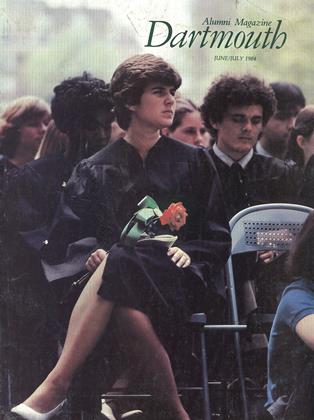It All Started with a Question
While in high school Ted Cooperstein (Potomac, Md.) wrote a European history paper on which his teacher wrote: "Interesting question, but was the situation the same in 1812?" Over the last four years, while searching for an answer, Cooperstein has drawn maps, travelled to Europe, and researched and written extensively on the subject: an independent study, an hon or's thesis and, the culmination, a full year of study as a Senior Fellow, "Modern European Invasion of Russia, 1706-1945, A Comparative Analysis." "I just sort of decided what I wanted to do, found it and jumped right in," he explained.
At first Cooperstein down-plays his work as if most undergraduates complete their major sophomore year to permit two years of scholarship in a single area. "I guess it was just the interest. It really didn't require me to be a massive geek or anything. A lot of it was mutually supportive. When you come to one course you have already learned some of it in another course and don't need to learn all the details over again."
Cooperstein, who is in the process of writing the final pages of the more than 200 he has written on the invasion of Russia by Charles II (1706-09), Napoleon I (1812) and Hitler (1941), said of his motivation, "This is the opportunity to pursue something interesting academically or intellectually for the sheer experience or pleasure in it before getting more involved in something more pragmatic: professional work or graduate school. It's really taking advantage of what we have here. It's certainly a waste to pass it by."
Assistant Professor of History Rowena Reed, who has taught Cooperstein in three courses and served as his advisor, used words like "ambitious" and "conscientious" to describe her student. "I would say that he knows what he wants and knows how to get it."
Cooperstein agrees, "I always have the tendency to bite off a lot whether I can chew it or not."
Indeed Cooperstein has bitten off a lot during his four years at the College and in the process managed a , 3.76 grade point average. In addition to his scholarship, he has served as executive editor of The Jack O'Lantern, senior editor for TheDartmouth Review (he used the pen name "Ted Crown" for both publications), studied on an LSA program in Mainz, West Germany and is a member of Zeta Psi fraternity.
Cooperstein is also a second lieutenant in the U.S. Army Reserve. He explained his rather inauspicious start. "Freshman spring I was looking for a summer job without much success and I got a brochure from the Army: basic training camp in Fort Knox, no commitment, free room and board, free transportation. When all of my job offers fell through, I said 'What the hell.' It looked like a lot of fun and was a way to get in shape ... I figured I had nothing to lose."
Cooperstein said he enjoyed the camp so much that he competed for and won a two-year scholarship. During sophomore and junior years he travelled two hours a week to Norwich University to attend classes in military law, ethics and basic problem solving he was exempted from the course on military history for obvious reasons and now has a limited eight-year commitment in the Reserves. Cooperstein praises the benefits of the experience. "It was a bit more broadening. It's another opportunity to learn and meet people; some are gung-ho military, others are just doing it for the scholarship. ... You learn to look at things a little differently. There is also the element of self-discipline and keeping yourself in shape."
Next year Cooperstein, whose law school acceptances differ very little from anyone's list of the top eight, plans to attend Stanford Law School and said he has "an inclination to corporate internatiohal law."
Is he an intellectual? Cooperstein's answer is quick. "I am, but I wouldn't limit myself to that. ... I essentially enjoy learning anything if it's well-taught. That's what I like about Dartmouth, the opportunity to be well-taught."
"That's what I likeabout Dartmouth,the opportunity to bewell-taught."
 View Full Issue
View Full Issue
More From This Issue
-
 Feature
FeatureProfessor John Stearns '16: Rara Avis Una
June | July 1984 By Eddie Chamberlain '36 -
 Feature
FeatureCreativity: The Open Dance at Dartmouth
June | July 1984 By Prof. Blanche Gelfant -
 Feature
FeatureWearers of the Green
June | July 1984 By Jim Kenyon -
 Feature
FeatureThe Best Part of My Academic Life Here
June | July 1984 -
 Feature
FeatureMaking it Happen
June | July 1984 By Peggy Sadler -
 Feature
FeatureThe Quiet Good Man
June | July 1984 By Young Dawkins '72
Brad M. Hutensky '84
-
 Feature
FeaturePLATT
JUNE/JULY 1984 By Brad M. Hutensky '84 -
 Feature
FeatureCALLAHAN
JUNE/JULY 1984 By Brad M. Hutensky '84 -
 Feature
FeatureBURNLEY
JUNE/JULY 1984 By Brad M. Hutensky '84 -
 Feature
FeatureBERNSTEIN
JUNE/JULY 1984 By Brad M. Hutensky '84 -
 Feature
FeatureGISH
JUNE/JULY 1984 By Brad M. Hutensky '84 -
 Feature
FeatureSMITH
JUNE/JULY 1984 By Brad M. Hutensky '84
Features
-
 Feature
FeatureFEBRUARY'S BIG EVENT: The Hopkins Dinner in New York City
January 1958 -
 Feature
FeatureNewly Elected Members of the Alumni Council
OCTOBER 1965 -
 Feature
FeatureCOMMENCEMENT 1967
JULY 1967 -
 Feature
FeatureAbout Students
April 1975 -
 Feature
FeatureLap After Grim Lap, Note After Sparkling Note
April 1976 By DAVID M. SHRIBMAN '76 -
 Cover Story
Cover StoryOUR SEARCH FOR J.D. SALINGER
SEPTEMBER 1994 By Jane Hodges '92


